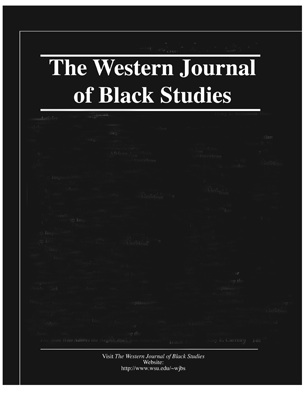Volume 33, Issue 4
Framing the Literacy Issue:
Correcting Educational Misrepresentations in U.S. Society
Daphne W. Ntiri—Wayne State University
A good part of the recent public debate in US educational policy circles has focused on the myriad challenges we face as a nation on literacy achievement particularly in urban communities and among African Americans. In this paper, we examine the problem of framing in literacy that confronts advocates and policy makers who seek to address this deeply entrenched social issue but are challenged by numerous structural constraints on the part of the government, the community and the individual. The paper presents arguments embedded in critical race theories that raise questions surrounding why and how long the illiteracy issue can be framed as an ‘African American dilemma or problem’ and whether Eurocentric approaches in the classroom should be replaced by Afrocentric ones to improve scholastic achievement among African Americans.
pp. 231-239
Neoliberalism, Illiteracy, and Poverty:
Framing the Rise in Black Women's Incarceration
Mary V. Alfred—Texas A&M University
Dominique t. Chlup–Texas A&M University
As welfare and prison reform shape public discourse about incarcerated women, there needs to be deeper conversations about sociohistorical, political, and economic causes of increased incarceration of Black women. In this paper, we present the characteristics of women offenders and explore the impacts of neoliberalism, poverty, and illiteracy on the increase of Black women’s incarceration. Using critical race theory as a guiding framework, we present the argument that neoliberal welfare reform policies and crime control policies exacerbate illiteracy and poverty, thus contributing to women’s criminal activities. We emphasize gender-responsive strategies when planning and implementing programs for low-income, low-literate, and incarcerated women.
pp. 240-249
Exploration of the Lived Experiences of Illiterate African American Adults
LaTonya Waters—Port Arthur Independent School District, Port Arthur Texas
Sandra Harris—Lamar University
This phenomenological study examined the stories of illiterate African American adults to investigate factors contributing to their illiteracy. Narrative techniques were utilized to discern themes from narrative accounts of eight participants. The participants were enrolled in one of two adult basic education programs referred to as ABE I and ABE II. They responded to questions regarding their early education experiences, coping skills, and reasons for enrolling in an adult basic education program. The recurring story elements that were identified as factors that contributed to the participants’ low literacy levels were family educational background and negative school experiences.
pp. 250-258
Knowing and Teaching Elementary Language Arts:
A Math Lesson for English Teachers
Greg Bowe—Florida International University
This article suggests that the delivery of language arts and English curriculum in our schools, from kindergarten through university, may unwittingly but significantly contribute to enlarging the social divide between majority and minority students. Recent theoretical and pedagogical constructions from mathematics teaching are discussed. Historical and practical influences on the history and formation of the school subject known as “English” precede examples of student alienation and confusion about the relationship between their home and school languages. Finally, after arguing that English and language arts teachers need to know more about the English language, the article concludes that the recent changes in mathematics instruction may usefully serve as possible models for analogous changes in the field of English teaching.
pp. 259-272
Relevance, Equivalence and Progression in an
Adult Basic Education Curriculum for Botswana
Akpovire Oduaran
—University of Botswana
Oitshepile M. Modise—University of Botswana
The Department of Out of School Education and Training, Ministry of Education and Skills Development, Republic of Botswana has been engaged in a rigorous exercise to reform the adult basic education program. In this paper, we discuss briefly how the issues of relevance, equivalence and progression have been applied to the planning process built into the adult basic education program. We argue that a suitable progression scheme is required to enable adult learners to move on to an adult relevant post-basic education program which would enable them to acquire a recognisable certificate that can help them fit into the learning society and knowledge economy being created in Botswana.
pp. 273-281
The Experience of Isolationin Alternative Education:
A Heuristic Research Study
Debra Mayes Pane—Florida International University, Miami
Angela Salmon—Florida International University, Miami
An epistemological crisis underlies the abysmal state of literacy education for African American students who are disproportionately racialized, marginalized, and isolated in schools and society. A cultural deficit paradigm perpetuates traditional pedagogies that highlight students’ presumed weaknesses. Transformative Black Education and Critical Race Theory in Education provide a reconceptualized conceptual framework for transforming hegemonic oppressive social structures in literacy education with African American students. This heuristic research study explores the experience of isolation in alternative education for a White teacher with African American students as it relates to transforming teacher mindsets about teaching reading and eradicating the literacy/illiteracy social divide through transformative literacy arts-based inquiry.
pp. 282-292
Book Reviews
Unequal Crime Decline:
Theorizing Race, Urban Inequality, and Criminal Violence
Author: Karen F. Parker
Reviewer: M. Shawn Carter, Jacksonville State University
pp. 293-294
Gullah Culture in America
Author: Wilbur Cross
Reviewer: Jamie Elizabeth Gabrini, M.S. ED.,
pp. 295-296
The White Pacific:
U.S. Imperialsim and Black Slavery in the South Seas After the Civil War
Author: Gerald Horne
Reviewer: Matthew W. Hughey, University of Virginia, Charlottesville
pp. 297-298

| The WJBS site is normally maintained by Tanya Gonzales. Please feel free to e-mail comments, queries, and suggestions. |
Heading using the h3 tag
Lorem ipsum dolor sit amet, consectetur adipisicing elit, sed do eiusmod tempor incididunt ut labore et dolore magna aliqua. Ut enim ad minim veniam, quis nostrud exercitation ullamco laboris nisi ut aliquip ex ea commodo consequat. Duis aute irure dolor in reprehenderit in voluptate velit esse cillum dolore eu fugiat nulla pariatur. Excepteur sint occaecat cupidatat non proident, sunt in culpa qui officia deserunt mollit anim id est laborum.